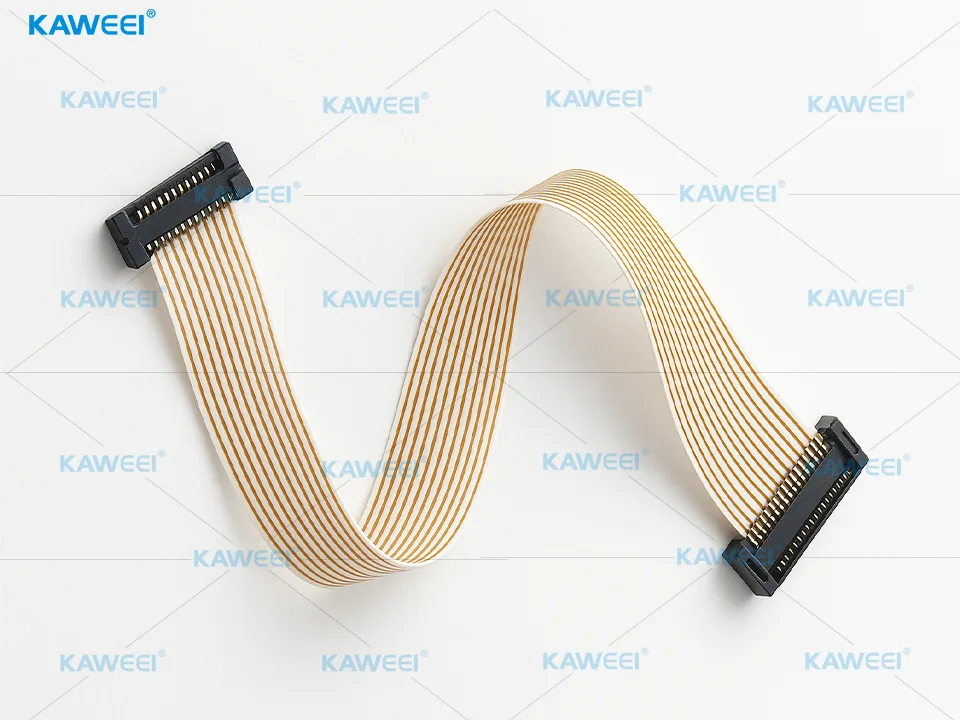FFC Cable Solutions in the Wiring Harness
FFC (Flexible Flat Cable): An Overview of Features and Applications
FFC, or Flexible Flat Cable, is a type of electrical cable constructed from multiple parallel conductors sandwiched between layers of flexible insulating material, typically polyimide or polyester. This design allows it to be used in environments with limited space and a need for flexible connections.

Key Characteristics of FFC
FFC cables are defined by a set of distinct physical and functional properties:
-
Thin and Lightweight Profile
The cable has a minimal thickness and low weight. This allows for integration into compact devices without adding significant bulk or mass, making it suitable for space-constrained applications. -
High Flexibility
The materials used provide a high degree of flexibility. The cable can be bent and routed around obstacles, which is necessary for installations with complex paths or for connecting moving parts within a device. -
High-Density Connection
The parallel arrangement of conductors enables a high number of connections within a small cross-sectional area. This facilitates the efficient and stable transmission of multiple electrical signals, which is a requirement for many modern electronic devices. -
Customizable Design
FFCs can be manufactured to specific requirements. Parameters such as length, conductor count, pitch (spacing between conductors), and connector type can be adjusted to match the needs of a particular application. -
Cost-Effectiveness
The manufacturing process for FFC is relatively simple compared to traditional round cables. This results in shorter production cycles and lower overall costs, which is a significant factor in high-volume manufacturing.
Application Scenarios
The specific characteristics of FFC make it a suitable component across a wide range of industries.
-
Consumer Electronics
- Smartphones & Tablets: Connects the display to the mainboard.
- Laptops: Used for connections between the keyboard, touchpad, and display.
- Printers & Scanners: Provides flexible internal connections within compact mechanisms.
-
Automotive Industry
- Instrument Clusters & Infotainment Systems: Connects displays, control units, and audio/video components, facilitating data transmission for driver information and entertainment.
-
Medical Equipment
- Patient Monitors (e.g., ECG): Transmits vital sign data from sensors to the main unit, requiring stable and accurate signal transfer.
- Ultrasound Machines: Used for internal connections where reliable data transmission in a complex environment is necessary.
-
Industrial Automation
- Industrial Robots: Connects moving parts (e.g., robotic arms) to the control system, providing reliable signal and power transmission during motion.
- Automated Test Equipment (ATE): Serves as a solution for high-density interconnections within densely packed test fixtures.
-
Home Appliances
- LCD TVs: Connects the display panel to the main control board.
- Microwaves & Washing Machines: Used for internal signal transmission between control modules and user interfaces.
-
Aerospace
- Avionics: Its lightweight nature contributes to overall weight reduction in aircraft. It is used to connect flight instruments and other critical electronic components.
- Navigation Systems: Meets the requirements for high-density and high-reliability signal transmission in navigation and communication equipment.
Conclusion
FFC is a fundamental component in modern electrical systems. Its combination of a thin profile, flexibility, high-density interconnects, customizability, and cost-effectiveness makes it a practical solution for a wide array of applications. It is particularly effective in compact devices and environments that require dynamic or complex routing, establishing it as a key element in the design of numerous electronic products across various industries.
Kaweei FAQ
Q:What kind of company is Kaweei?
A:Kaweei is a professional wiring harness manufacturer specializing in the design, production, and delivery of high-quality wiring solutions, including FFC (Flexible Flat Cable), PFC harnesses, and automotive harnesses.
Q:What types of FFC products can Kaweei provide?
A:Kaweei customizes Flexible Flat Cables (FFC) with different pitches, lengths, conductor counts, and terminal treatments, widely used in electronic devices, LCD displays, printers, and automotive electronics.
Q: Why choose Kaweei’s customized FFC products?
A:With advanced production equipment and strict quality control, Kaweei ensures FFC products with high flexibility, excellent bending resistance, and superior conductivity, fully tailored to customer specifications for complex applications.
Q:What is Kaweei’s FFC customization process?
A:Customers only need to provide technical specifications (such as pitch, pin count, length, and terminal type). Kaweei’s engineering team will design, prototype, test, and deliver high-quality customized FFC products.
Q:Which industries are Kaweei’s FFC products suitable for?
A:Kaweei’s FFC solutions are widely applied in consumer electronics, industrial equipment, automotive electronics, medical devices, and communication equipment, offering more flexible and reliable connectivity.




